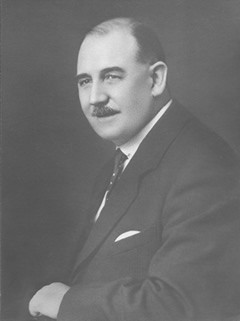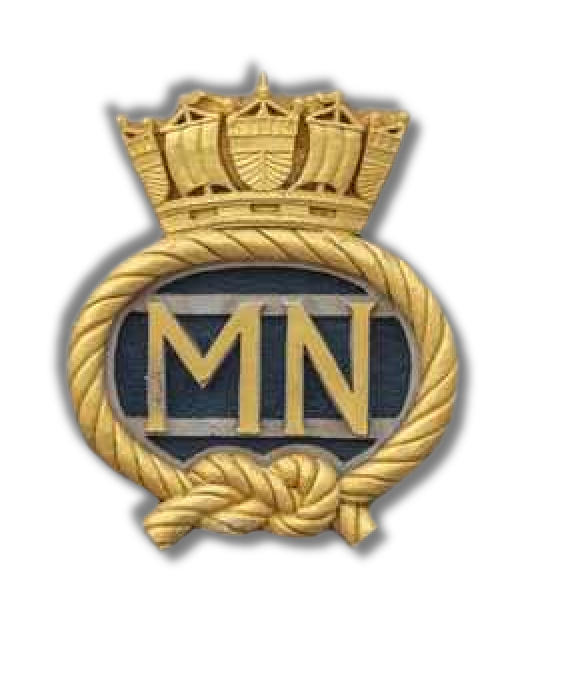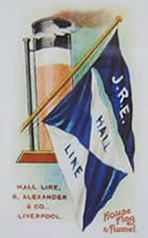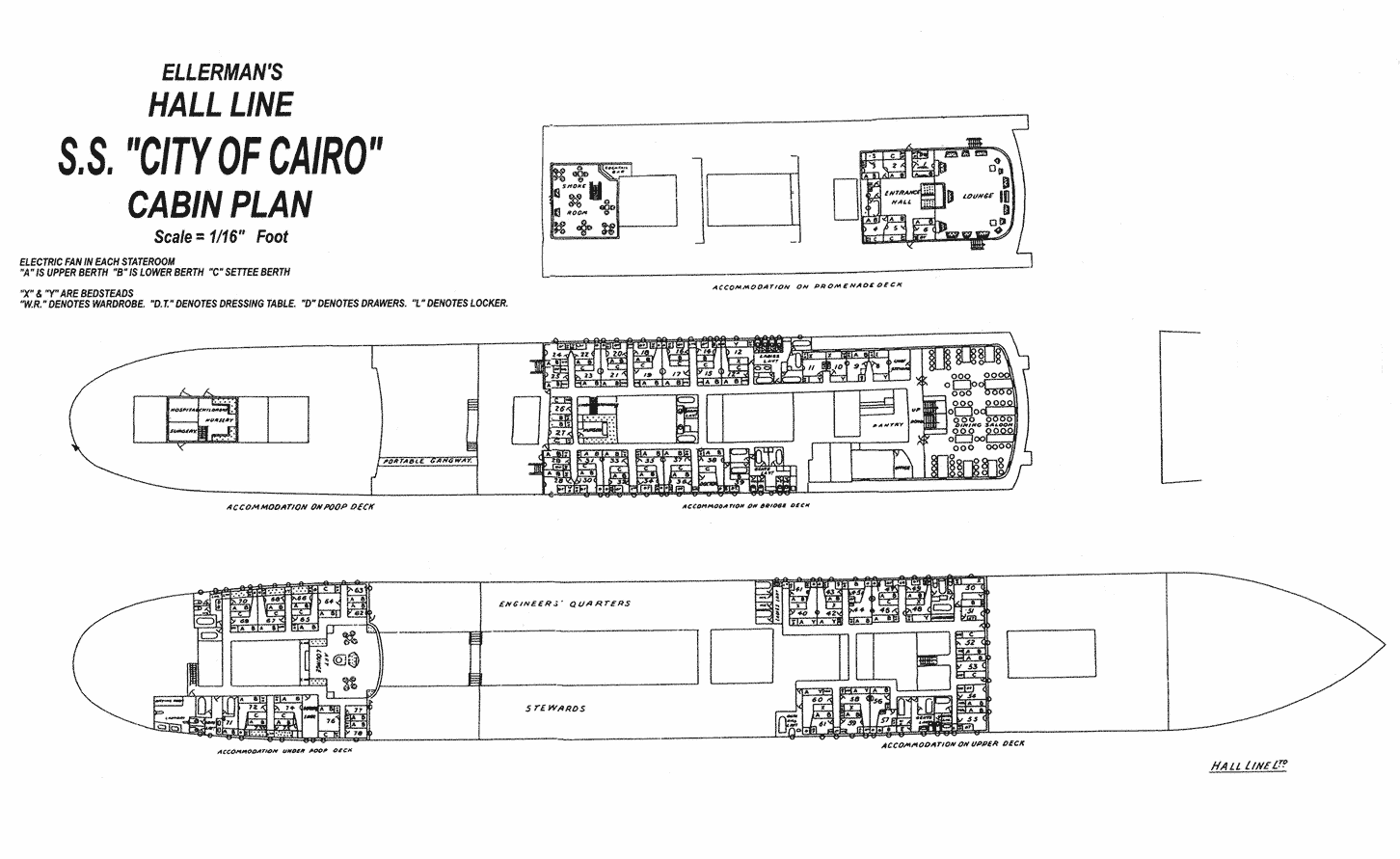Lost At Sea - A Letter
Robert Keith
Courtesy of Colin Keith
Robert Keith and Daniel McNeill became friends as they waited in Bombay for a ship to take them back to the UK. On board the "City of Cairo", they shared the same cabin and after the ship was torpedoed they were together in No.8 lifeboat. In the early hours of Monday 9th November 1942, Robert Keith witnessed his friend being lost overboard from the lifeboat. Below is a copy of the letter that he sent to Mrs. McNeill explaining the circumstances in which her husband lost his life at sea. The letter is courtesy of the McNeill family.
Dear Mrs McNeill,
After a voyage which to me still seems to have been like part of a horrible nightmare I have arrived home, and I feel that I would now like to write to you and give you particulars of the circumstances under which your husband lost his life at sea.
First of all, I would like you to know of my sympathy with you in your great loss. You have indeed suffered a cruel blow and it gave me much sorrow to have to include the sad news in the cable that I sent to my wife after my rescue and return to Capetown.

Daniel McNeill
Courtesy of the McNeill family
As you may have heard, Mr McNeill and I arrived in Bombay about the middle of August and we were both very disappointed to learn on our arrival there that we would have to wait several weeks for a steamer. For 7 weeks we waited patiently, hoping every day that we would get news of the sailing from Bombay of a ship of the large and fast type. During our stay in Bombay Mr McNeill and I saw a great deal of each other. We stayed in the same boarding house and had many pleasant walks together. At the end of September we were offered passages on a small City Line boat. It was with much reluctance that we agreed to travel on that boat, but we had already waited long enough, and according to the shipping agents, there was no likelihood of there being any bigger or faster ships available for a long time. The information given to us may have been all that was known to the agents at that time, but since arriving home I have discovered that a fast ship left Bombay for home a few weeks after we sailed. I received a letter from Tom Hodge the other day and I was greatly surprised to hear that he had sailed from Bombay on the 26th of October and reached the U.K. on the 9th of December. Your husband and I paid a visit to the Hodges on the night before we left Bombay and on the 1st of October we embarked on the "City of Cairo". We arrived at Durban on or about the 20th of October and spent a few days at that port. Your husband purchased some clothes there, also a supply of provisions for bringing home such as tea, coffee, dried fruit, chocolate, etc.
Although our ship was quite a slow one we did not travel in a convoy and this to my mind was rather surprising, considering we had over 300 people on board including a big number of women and children. However, we reached Capetown without any incident and left there on the 31st of October still all on our own.
Mr McNeill, a Mr Marshall from Glasgow, and myself shared the same cabin, and, though it was much too small for three persons, on the whole we were quite comfortable and got on very well together. Along with an elderly gentleman from Sunderland we usually played whist in the lounge after dinner, and on the night of the 6th of November your husband and I had seated ourselves in adjacent chairs in the lounge to await the others coming up from dinner. About 8.20pm, there was a terrific bang which almost threw us out of our chairs, the ship shuddered violently, and before any of us could move all the lights went out. I grabbed my lifebelt which was lying handy at my feet and put it on. Your husband did likewise and together we groped our way in the dark to our lifeboat station (No.8 lifeboat). After seeing that all the women and children belonging to our lifeboat had got into their places the menfolk got in, and gradually the boat was lowered into the water without any mishap. I think our boat was the first to get away from the ship. We rowed for a short distance and then waited for the other boats to join us. While waiting we could see the "City of Cairo" still afloat and then 20 minutes after she was first struck a second torpedo was fired at her, and this sent her to the bottom in two or three minutes. A huge black cloud of smoke arose when the second torpedo hit the ship and when the smoke cleared away there was no ship to be seen.
One lifeboat was lost while being lowered and another was thrown some distance and rendered useless when the second torpedo hit the ship. The occupants were thrown into the water and spent over an hour in the water before being rescued by the other boats. Our lifeboat picked up a number of women and children in nightgowns and pyjamas and your husband helped in pulling these unfortunate children into our boat. Mr McNeill took a turn also at rowing on the first night, but found it too much for him and had to give it up.
I am unable to say how many lives were lost when the ship was torpedoed. I don't think there could have been many, for although it was a fairly dark night the sky was starry and visibility was not too bad. The sea was also very calm at the time. In the morning the six lifeboats gathered together and we started on our way to the island of St Helena which was roughly 500 miles from the spot where the ship was sunk. We were about 1700 miles from the African mainland and 2000 miles from the coast of South America. We were really in a very bad position, but were led to understand that an S.O.S. had been sent out to Capetown and answered before the ship went down, so we had hopes of a flying boat coming to our aid in a day or two. I doubt very much whether any S.O.S. was sent out. Anyhow no message was received by Capetown and Saturday 7th November passed without any plane being seen, and when Sunday came and went without any sign of help coming our way our spirits began to fall.
During Sunday afternoon your husband told me that he was taking bad shivering fits which left him with severe headaches. I could see that the strain of sitting in the one position hour after hour was beginning to tell on him and once we changed places to see if he could be more comfortable. There were 55 persons in our boat which was more than ever the boat was intended for. It was quite impossible to get a comfortable position in which to sleep or even recline. We had 31 Indians with us and most of them sat in the well of the boat at our feet. They were also cramped for room and kept getting in the way of our legs. After darkness fell on Sunday evening your husband told me that he was not feeling at all well. He was suffering from numbness in his limbs and had to put up with much discomfort on account of the Indians down below resting against his legs. Some time after midnight (Monday morning 9th November) Mr McNeill told me that he was going to try to draw his legs up and in order to give him as much room as possible I moved up as close as I could to the person on my right. I felt your husband extricating his legs and a few minutes later I heard a slight splash. I put out my hand and to my horror found Mr McNeill's place vacant. It was very dark and I would see nothing clearly. I raised the alarm at once, shouting out your husband's name and several torches were flashed on the water. Twice I saw Mr McNeill at a distance of about 10 yards when flashes lit up the water, and I noticed that he had his lifebelt on. He had uttered no cry when he fell overboard and was making no movement with his arms so far as I could see. There also seemed to be absolutely no sign of life in his features and I gained the impression at once that life was extinct. It is my firm belief that your husband died before he fell overboard or from shock immediately he entered the water.
Nobody knows how Mr McNeill fell overboard. He may have been standing to relieve his cramped feeling as Mr Miller has mentioned in his letter to you. Mr Miller did not, however, witness the accident having been seated at the other end of the boat when it happened.
On that particular night the six lifeboats were tied together and we were being towed along in a line by the Captain's boat which had its sails up. We were moving along at a fairly good speed and in the heavy sea that was then running it was not possible to stop the boats at once. Before anything could be done Mr McNeill was lost in the darkness.
The tragedy of your husband's death was a great shock to me and the memory of that night kept me from sleep many a time even after we had reached safety. Thoughts of coming to see you, if I did get home were constantly in my mind, and had I possessed your address when I reached this country last week I would have probably paid you a visit before coming north. If you would still like to see me, please just let me know. I would like to help you in any way I can. Provided I am not fixed up in a job before I hear from you, I could easily arrange to travel to Edinburgh.
My experience of 13 days in an open boat without sufficient food and water was a dreadful one. All we had to exist on was a tablespoonful of water, a piece of chocolate about an inch square, a Horlicks milk tablet, a small hard biscuit and a little Pemmican twice per day. We had several very rough nights, and when waves came over the boat and drenched me to the skin I almost gave up hope of ever being well enough again to tell the tale. We were all in a pretty poor condition when a cargo boat was sighted on the 13th day. By that time four men had died in the lifeboat and several others were sinking fast. Mr Scaife, the Sunderland gentleman who played whist with us, was very ill in the lifeboat from the fifth day onwards and he died on the 13th day a few hours after being taken aboard the ship that rescued us. After Mr Scaife took ill he remarked to me "Mr McNeill is well out of it all". I also felt that it was a mercy that your husband was taken when he was and thus spared the lengthy ordeal that the rest of us had.
Your husband met the Rev Lachlan MacLean on the "City of Cairo" and spent a lot of time with him. I understood that Mr MacLean got away safely on another lifeboat, but I noticed that he had been reported as lost at sea on account of enemy action. I believe Mr MacLean belonged to Crieff also. I do not know how the other five lifeboats fared after we all separated during the 2nd week, but I'm afraid many lives have been lost.
At the time of the accident your husband was carrying on his person a number of Cook's Traveller's Cheques, and I think their value must have been between £30 and £40. These cheques were purchased by him from Cooks, Calcutta and a few, I think, were cashed at Durban when he made some purchases. I understood from what your husband told me that he had £50 in traveller's cheques when he joined the boat at Bombay. I have no doubt that the London office of Thos Cook & Son will be able to get this verified for you.
Most of us kept handy in our cabins a small bag containing important papers and clothes we wanted to take with us, but when it came to the bit we got into the lifeboats with only the clothes we stood up in. All my traveller's cheques were left in my cabin in my so called escape bag, and I arrived back at Capetown with only a few shillings in my pocket. However, I was able to borrow money from the shipping agents there to help me out.
I am enclosing a letter which was written to you by a Mr Miller who had been in India for some years as a missionary amongst the lepers. For censor purposes this was left unsealed. I'm afraid the envelope looks rather dilapidated due to having been in my coat pocket since it was written and I must apologise for its condition.
My sympathy, and that of my wife, goes out to you in your sorrow. Like everyone who came in contact with your husband I came to have much respect for his sincerity, sound advice, and honesty in everything.
Yours very sincerely,
R. Keith






